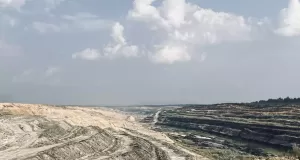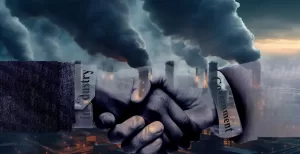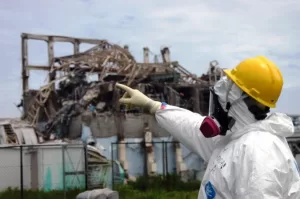The people of Kendrapada district of Odisha are fighting peacefully for last two years to save their river Kharasrota. This river is the lifeline of farmers, fishing communities and other communities living besides the river. The Kharasrota river is the source of life and livelihoods for the people of Odisha in general and people of Kendrapada and Jajpur in particular. The successive governments have failed to provide safe drinking water to the people of Odisha. The people of the Kendrapada district continue to drink unsafe drinking water from the river. The Kharasrota river provides water for both drinking needs of the people and water for irrigation to agricultural fields of the district. The people living in the downstream of Kharasrota river are facing acute drinking water crisis both during the rainy season and during the summer season. The rainy season brings severe floods, and the muddy water is impossible to drink. The water flow declines in the river during the summer and salty water from the Bay of Bengal enters into the Kharasrota river. The water becomes unusable for drinking and agricultural purposes. The Government of Odisha has not done anything to address this water crisis in the region.
In order to supply water to the Dhamra Port Company Limited (DPCL) in the Bhadrak district, the Government of Odisha is using its Basudha Drinking Water Scheme. The DPCL is a 100% subsidiary of the Adani Ports and SEZ. The Government of Odisha is spending Rs 892.14 crore to supply water to the Adani Ports and SEZ in the name of supplying water to the people of Bhadrak district. The Odisha government has Rural Water Supply and Sanitation Department of Panchayati Raj and Drinking Water Departments to implement drinking water projects. However, this drinking water project is outsourced to the Hyderabad based company called the Megha Engineering India Pvt Ltd. The reasons behind the outsource is best known to the Government of Odisha and its leadership. This company is implementing the project in the Kharasrota river near the Gadagadi Ghat under the Barunadiha Panchayats of Rajkanika block of Kendrapara district.
The local people argue that in the name of drinking water project for the people of Bhadrak district, the Government of Odisha is implementing this project to supply water to the Adani Ports and SEZ in Dhamra as it is close to Rajkanika. The people of Aul and Kanika are not opposed to the drinking water project and water supply to the people of Bhadrak district. The Government of Odisha is unnecessarily creating disharmony between the two neighbouring districts by providing wrong information to the media and campaigns against the protesters. The protesters of Aul and Kanika are making six fundamental points.
- The Bhadrak district has major rivers and water can be used from the local rivers for the drinking needs of the district. It will be cost effective for the Odisha government as well. Why is it necessary to take water from the Kharasrota river? It is neither convenient nor cost effective. It puts pressure on the water needs of the local people living around the Kharasrota river.
- The people of Aul and Kanika are arguing that the Government of Odisha must conduct a scientific study and environmental assessment on the impact of this project on the local communities and their water requirements. What would be the ecological impact of this project on the Bhitarakanika National Park and its mangroves? The Bhitarakanika Mangroves protect communities from regular super cyclones in the district.
- The protesters argue that the project will aggravate the water crisis in the region. Therefore, the government of Odisha must create an environmentally sustainable barrage that can save the surplus overflow of the water to the Bay of Bengal. The surplus water can be used for the drinking water projects both for the people of Kendrapada and Bhadrak district.
- The government of Odisha must reveal the water requirements of the four blocks of the Bhadrak district. What is the water requirement of people of Bhadrak district? How much water overflows from the Kharasrota river? What is the local water requirements?
- The Government of Odisha must reveal the plans to stop the salt water from the Bay of Bengal entering into the Kharasrota river. It is neither drinkable nor usable for agriculture. This happens during the summer season.
- The Government of Odisha must release all the protestors arrested by the Odisha police on false grounds and end its undemocratic police raj.
These are very reasonable concerns and suggestions by the protestors to the Government of Odisha. However, the Government of Odisha is using brute police force to implement the project instead of engaging with people and their reasonable demands. The Odisha government is arresting anyone opposed to this project. The peaceful and democratic protests by the local people are declared illegal by the Government of Odisha by imposing the Section 144 of the Criminal Procedure Code (CrPC). Such undemocratic move by the Odisha government shows its commitment to the Adani Ports and SEZ at the cost of local people, their lives, livelihoods and their environment.
The selling of river to corporates is a death sentence to local communities. The international experiences of water and river privatisation show that it starts with drinking water projects. These projects serve corporate interests more than the drinking needs of people. The privatisation of water and commercial agriculture led to drinking water crisis across the world. The diversion of water to mining, industries and other corporations has aggravated water crisis.
The decades of water privatisation has failed across the globe, but the BJP government continues to pursue and aggressively implements the failed policies of the previous Congress governments in India. The Government of Odisha follows the footprints of Chattisgarh government in making river a private property of corporates. It looks as if the BJD government in the state and the BJP government in centre are in competing with each other to serve corporate interests by selling rivers and water resources to corporates at the cost of people, their livelihoods and the planet. The successive governments in India continue to follow rent seeking regressive economic policies that put forests, rivers, mountains, land and other common goods for sale in the market, where corporates seek profit at the cost of people. The central government and state governments have continued with such a mercantile tradition despite of ongoing people’s movements for environmental, social and economic justice. The objectification of environment and commercialisation of rivers put life, livelihoods and planet in danger. Rivers belongs to communities living around the river. It should be used for the greater common goods of the communities and not corporations. Profit over people is a dangerous ideology that puts sustainability of our present and the future in danger.
(Bhabani Shankar Nayak is with the University of Glasgow, UK. Article courtesy: Countercurrents.org.)




